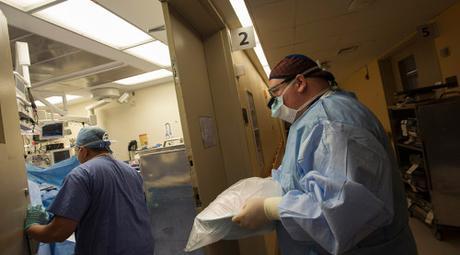There’s an increasing drumbeat for us to donate our organs.
Two days ago, the Netherlands took an important step toward increasing the number of organ donors when the lower house of parliament approved a bill for “presumed consent” of organ donation.

Doctors preparing for organ transplant (Photo by Keith Bedford/Reuters)
Organ donation is when a person allows healthy transplantable organs and tissues to be removed, either after death or while the donor is alive, and transplanted into another person.
There are two types of organ-donation consent:
- Explicit consent, also called “opt in” consent, refers to the donor giving explicit, direct consent through proper registration depending on the country. In the U.S., for example, many states enable you to state you’re an organ donor on your driver’s license.
- Presumed consent, also called “opt in,” does not need direct consent from the donor or the next of kin. Instead, it is presumed that anyone who has not explicitly refused is a donor.
In the case of the Netherlands, as reported by RT, on September 13, 2016, a “yes, unless” bill for presumed consent was narrowly approved by a 75-74 vote in the lower house of parliament. If approved by the upper house and passed into law, every single Dutch citizen would be put on the organ donation list, unless they explicitly request otherwise.
Obviously, the presumed consent method harvests more organ donation. As an example, Germany, which uses an opt-in explicit consent system, has an organ donation consent rate of 12%, whereas nearby Austria, a country with a very similar culture, uses an opt-out presumed consent system and thus has a consent rate of 99.98%.
Currently, the United States and the United Kingdom require explicit consent for organ donation, but there’s a movement to change it to presumed consent. Not all of the UK operates on explicit consent: In December 2015, Wales switched to presumed consent — a move that was expected to increase the amount of donors by 25%. Under the new policy, people over the age of 18 who have lived in Wales for more than 12 months and die in Wales are automatically considered organ donors, unless they have specifically opted out.
There is a lucrative international market for transplantable organs. In the case of China, we have compelling evidence and testimonies that government officials collude with hospitals to provide on-order transplantable organs from executed prisoners. (See Wikipedia)
See also:
- Euthanasia on the rise in America due to lucrative organ-harvesting
- California legalizes euthanasia
- California’s culture of death: 2 in 3 voters favor euthanasia
- Canadian doctors to get euthanasia kits
~Eowyn

